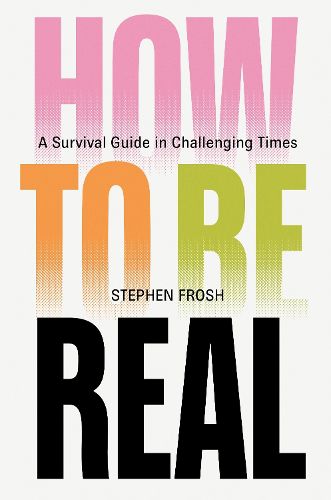Readings Newsletter
Become a Readings Member to make your shopping experience even easier.
Sign in or sign up for free!
You’re not far away from qualifying for FREE standard shipping within Australia
You’ve qualified for FREE standard shipping within Australia
The cart is loading…






How to be Real tackles one of the most urgent questions: how can we thrive in a world that is so troubling and confusing? We are constantly being told that we must be 'authentic' and 'real' whilst our sense of reality is being undermined, fragmenting our experiences and dividing people from each other. In the face of such dilemmas Frosh argues that gaining a sense of reality requires us to face the complexity of modern life. We must learn to think more clearly and bravely about it, and to allow ourselves to develop a depth of feeling that may often be uncomfortable or even distressing to live with.
By working alongside thinkers such as Freud, Winnicott and Klein, Frosh argues that we must look to what connects us and appreciate how authenticity depends on the quality of relationships we form with each other. Consequently, 'how to be real' has political as well as psychological and ethical implications. It is out of such disruptive complexity that human depth and relational integrity arise. Frosh pursues this through an exploration of childhood and the development of the self, of why and how we put up defences against reality, and of what hate means. The book describes how we might turn the ghosts that trouble us into ancestors that enrich our lives. It asks us to be brave enough to seek solidarity with others and, finally, to find the humanity in death.
$9.00 standard shipping within Australia
FREE standard shipping within Australia for orders over $100.00
Express & International shipping calculated at checkout
Stock availability can be subject to change without notice. We recommend calling the shop or contacting our online team to check availability of low stock items. Please see our Shopping Online page for more details.
How to be Real tackles one of the most urgent questions: how can we thrive in a world that is so troubling and confusing? We are constantly being told that we must be 'authentic' and 'real' whilst our sense of reality is being undermined, fragmenting our experiences and dividing people from each other. In the face of such dilemmas Frosh argues that gaining a sense of reality requires us to face the complexity of modern life. We must learn to think more clearly and bravely about it, and to allow ourselves to develop a depth of feeling that may often be uncomfortable or even distressing to live with.
By working alongside thinkers such as Freud, Winnicott and Klein, Frosh argues that we must look to what connects us and appreciate how authenticity depends on the quality of relationships we form with each other. Consequently, 'how to be real' has political as well as psychological and ethical implications. It is out of such disruptive complexity that human depth and relational integrity arise. Frosh pursues this through an exploration of childhood and the development of the self, of why and how we put up defences against reality, and of what hate means. The book describes how we might turn the ghosts that trouble us into ancestors that enrich our lives. It asks us to be brave enough to seek solidarity with others and, finally, to find the humanity in death.